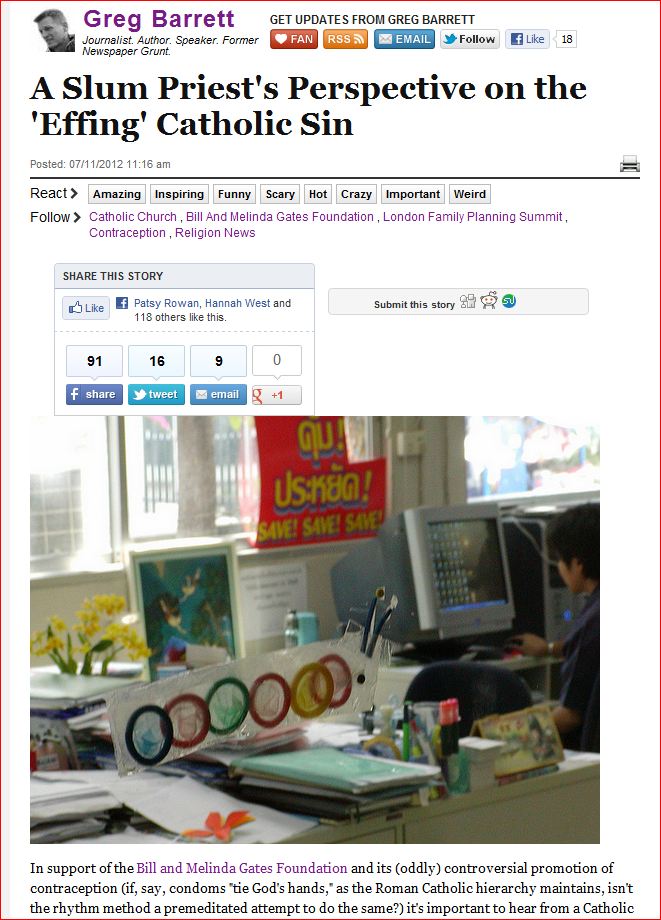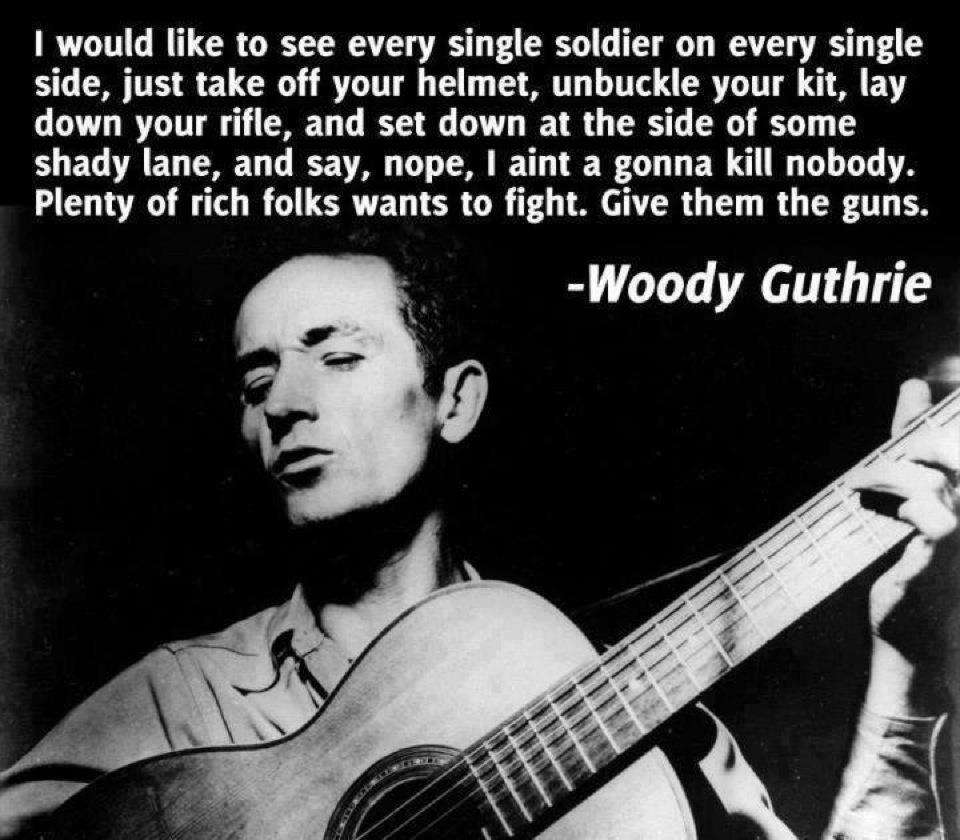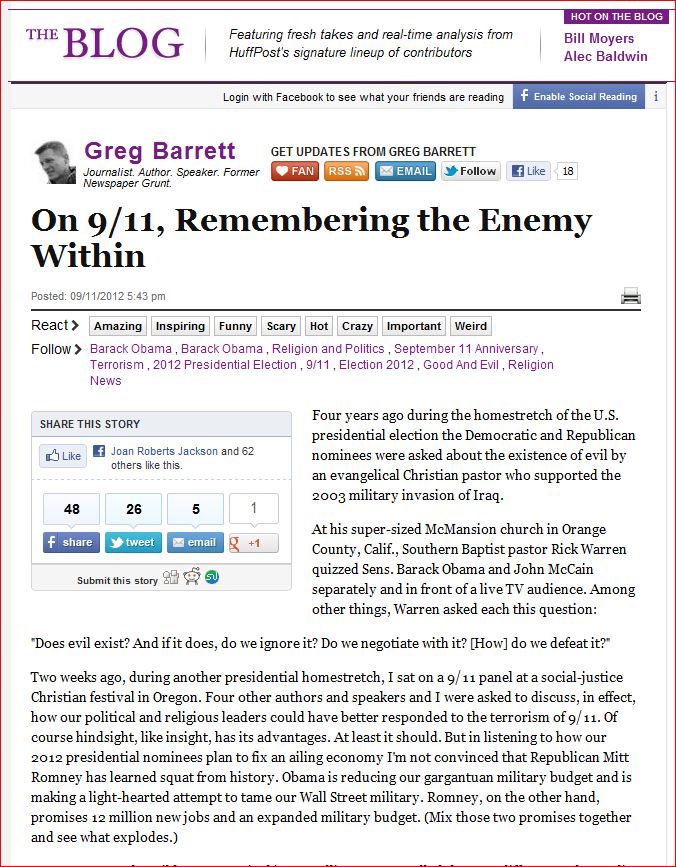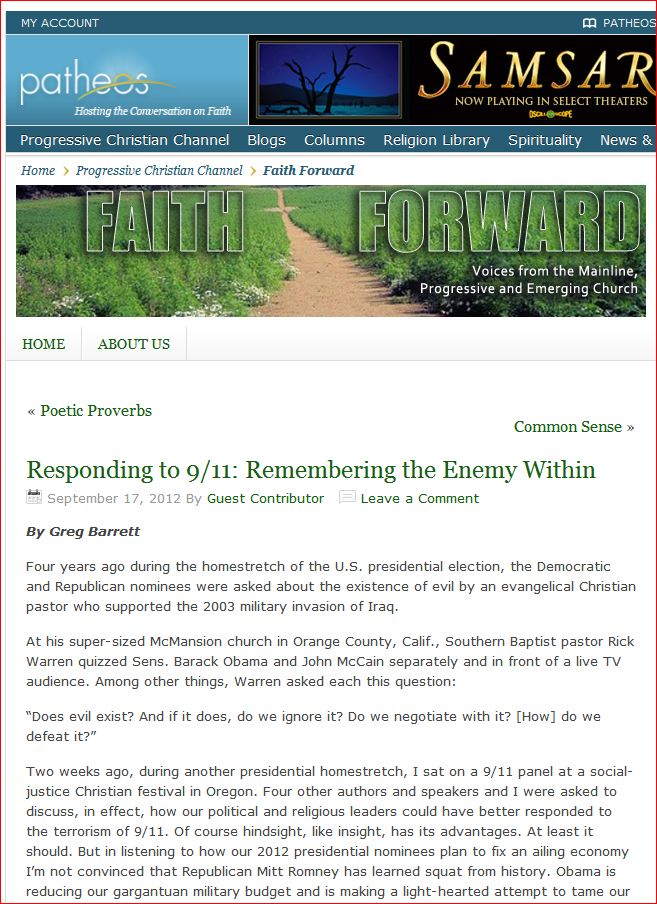
Decorative display at Father Joe Maier’s Mercy Centre orphanages and schools in Klong Toey, Bangkok, Thailand
In support of the Bill and Melinda Gates Foundation and its (oddly) controversial promotion of contraception (if, say, condoms “tie God’s hands,” as the Roman Catholic hierarchy maintains, isn’t the rhythm method a premeditated attempt to do the same?) it’s important to hear from a Catholic priest who works in the trenches of self-righteous consequences. That is, in the abject poverty where the absence of condoms leads to more than just outsized Catholic-sized families too large for developing world incomes. It also leads to STDs, most notably HIV/AIDS.
In July the Gates Foundation and the U.K. Department of International Development co-hosted the London Summit on Family Planning. In short, the summit’s goal is to inject a measure of sanity into the holier-than-thou political-religious debate about whether or not first world money should pay for third world contraception.
A few years ago when I was researching a book on a fiery social revolutionary who lived and worked in the port slums of Bangkok — the infected core of Thailand’s sex industry −- I asked him about the Catholic church’s stubborn stance on contraception. After all, Father Joe Maier is an outspoken Catholic priest famous for refusing to suffer fools. He’s a church outcast in that way. Taped to the windows of his <a href=”http://www.mercycentre.org/” target=”_hplink”>Human Development Foundation and Mercy Centre charity</a> were something you don’t normally see on public display in Catholic establishments. Or in any religious establishment: Condoms. Many condoms.
So one morning as we lingered over a pot of coffee I asked him about the condoms and Mercy’s “passive” (his adjective) promotion of them. They were strung outside of Mercy’s offices in various arrays of color and design -− a smiley face, a tree and what appeared to be a flower. The ones we’d just passed were arranged to look like a caterpillar: blue condom, orange condom, green condom, red condom, yellow condom, pink condom, lined up and taped across an office window off Mercy’s main breezeway. Rubber bands served as caterpillar antennae, a pencil eraser for an eye. It was a silhouette.
Seeing this art I’d suggested to Father Joe that Mercy’s promotion of condoms was something more than passive. It was aggressive. He flinched at first, as if I’d made an accusation, and he then began to step lightly around the issue. It was an odd gait for him.
“No, no, we don’t push them and we don’t endorse them,” he said. “We just put the information out where it needs to be. … It’s there. If it’s needed.”
Hoping he’d relax if he knew I was on his side I told him what I (an indigenous Southern Baptist, no less) thought about the subject: Condoms should be slung by the fistful into Bangkok’s slum streets, like candy in Macy’s Thanksgiving Day parade. All the better if it were done with the explicit consent of clergy — priests, pastors, abbots, imams, whomever.
At the time Father Joe and Mercy were caring for some 50 orphans infected with HIV/AIDS in utero, a number that fluctuated depending on the children just arriving at the orphanage and those who were newly dearly departed. Father Joe had told me earlier that morning that he could count six Mercy teenagers whom he thought were determined to work in Thailand’s sex industry. Some had friends and relatives already in it who flaunted the latest iPod, Blackberry, etc. Others had gambling- or drug-addicted relatives who needed money or family members sick and dying who needed the same. Whatever the reason, they were headed for an industry that promised fast cash.
“Massage places and karaoke bars, whatever else they call themselves. That’s what they’ll do, and that’s just an effing fact,” he’d said during our predawn interview and walk in Bangkok’s Lumpini Park (think Central Park, only smaller, lusher, nicer). It had been a few minutes past six and we’d just passed a group of girls (or boys — it’s often difficult to know) in tiny shorts and halter tops heading home from work. Back at the Mercy Centre I told him that during my 21-hour pilgrimage from Washington to Chicago to Tokyo to Bangkok, United Airlines had broadcast a video discouraging passengers from having sex … with children. “I am a child, not a tourist attraction,” the film’s young Asian girl had implored. The World Vision International video had been shown only on the trip’s final leg.
In my opinion, I told him, whether or not to promote the use of condoms in Thailand −- or anywhere else -− seemed like a nonissue to me. He didn’t immediately respond, so I did what I thought one was supposed to do when a priest sat quietly in front of you. I confessed. In two or three long breaths, I told of how I knew from my own hormonally charged youth and two glorious summers spent as a beach lifeguard that if a condom isn’t in the pocket or wallet at three pints and a few minutes past midnight, it doesn’t rank as a priority. And I’d come from the privileged stock that all of behavioral science calls low-risk: two-parent home, devoted mom and dad, mandatory Sunday school and church attendance with boilerplate warnings about something worse than AIDS: eternal damnation. I’d been risking my inheritance of the hereafter. At the precise moment when matters of gratification needed deciding, this meticulously planted fear had dissolved right along with my self-discipline. For me, every time. In my moderate Baptist church straddling the Virginia-Tennessee state line, the best ministers had spit more than Old Testament fire and brimstone. They preached New Testament forgiveness. Said God had an infinite supply. Convinced me of it. So despite the distractions of a pretty girl and all the blood drained from my brain, I always recalled that lesson. At the line of scrimmage at a quarter past midnight, it had been the only dog-eared lesson of my church upbringing.
Finishing, I waited for a knowing nod or absolution or something. Instead, Father Joe shifted in his chair, placed a hot mug of bitter slum blend on the table and leaned forward, elbows on knees with a finger pointing.
“That thing on?”
He was looking at my voice recorder. It was.
“On strictly moral issues,” he began, “there can be no give-and-take. I’m with the Church on that. Murder is murder, and killing is wrong. I’m against abortion, too. I should be clear on that. These things are wrong … just wrong. Now maybe it’s a case where the mother’s health is at risk or maybe you had to kill an intruder or kill to protect your children or whatever. But you feel bad afterward. That’s different. These were choices forced on you. … But does the sun come up in the morning and go down at night? Yes, yes, of course. Some things do not need debating.”
He paused, staring at the silver recorder with its glaring red “on” light.
“Now,” he continued, taking a deep breath. “Is it wrong to use a condom?”
The old Catholic popes and the newest old one too — Pope Benedict XVI, a conservative theologian steeped more in biblical curriculum than third world slums -− had maintained a ban on contraception that predated latex prophylactics and HIV pandemics. The Holy See has forever considered the seed of man holy. To divorce it from propagation by any method other than the careful navigation of menstrual cycles is the same as tying God’s (omnipotent?) hands. The pill, the diaphragm, the condom -− these are cheating. Thus sayeth Rome. Liberal Catholics had hoped that Vatican II, which culminated in 1965 with Good Pope John’s nudge of the church to loosen up, would end its ban on birth control. Instead, Pope Paul VI, a son of Italian nobility who’d taken a solemn oath against the heresy of Modernism, reaffirmed it with an encyclical titled <em>Humanae Vitae</em>. He described the “conjugal act” as the ordination of man’s highest calling: fatherhood. He declared that all men must be called back to the norms of natural law. “Each and every act of marriage must remain open to the transmission of life,” Pope Paul VI concluded.
This interpretation of “natural moral law” was God’s indisputable will, he’d written in that controversial encyclical. His immediate successors, John Paul I and II, carried out his wishes like marching orders to the end of one century and the beginning of the next. Meanwhile, HIV burned through much of Asia and sub-Saharan Africa, and hospices like Mercy’s became expert at marrying last rites to the realities of AIDS and poverty.
Father Joe scooted several inches closer to my recorder. He spoke slowly, enunciating each syllable so that every word registered.
“Condoms are what I call a doubtful moral issue. Go ahead, write it down. This is a doubtful moral issue. It’s not murder, it’s not abortion. Doubtful. Moral. Issue.”
He stopped and waited until I wrote it.
“Now, for me to tell people they must follow my religion and my religious beliefs on a doubtful moral issue that can put lives in danger -− <em>does</em> put lives in danger −- well, that is the height of arrogance.”
He paused, determined to maintain a cool demeanor and damp down the worst of his prolific cursing.
“The <em>height</em> of arrogance, isn’t it?” he continued, starting to nod his head more vigorously, grinding his teeth, squinting. I could see the pot begin to simmer. “Little Joey Maier from the slums of Longview, Washington, is going to tell these fervent Buddhists of Thailand that they cannot, will not, shall not use condoms? Who am I? The Spirit speaks to them as well as He speaks to me. No more, no less, no better, no worse.”
One week earlier, three of the six teenagers whom he feared would eventually work in strip bars and massage parlors had run away from one of Mercy’s four orphanages. They were back the same day, but for how long? Like all the kids, they hungered for independence and material gain — for whatever satisfaction and comfort our hip culture attaches to smart phones and 4G. It doesn’t matter how many Saturday Masses the kids of Mercy attend or how many different ways Father Joe tells the parable of mustard seeds falling on gravel and ground, some kids are going to find the shortcut. Thailand’s tourist economy and black market depend on it.
“So what do you do?” he asked rhetorically. “Do you just pretend that all will be fine and they’ll always listen and that they ultimately will make good choices? No. No! You bring a bunch of sex workers in here and let them talk to the girls, let them tell the girls about every detail of the business. These are the facts -− listen up girlies. Maybe they talk some sense into them.”
He thought about that.
“Probably not.”
He started to stand but sat back down like he’d been pushed. Then he began tapping the table with one finger, hard, like he was punching a number into his phone.
“But at least the girls will have been told that this is the way it is and this is the reality of it and this is what you have to do if you’re going to survive this shit, and this is how you protect your twat if you want to live, and these are the rules, and this is how it is, this is the game you’re getting into.”
All of this had come out in a single gust. He stood to refill his lungs, and when he did his cool resolve fell like a costume backstage. If he had stepped lightly before he stomped now.
“Use a condom? You asked me whether or not we should tell those girls to use condoms?”
Well, not exactly. I started to correct him but thought better of it.
“We damn well better tell them to use condoms! Not only that, we better tell them the whys and the hows and the whens. … What a sin! What an <em>effing</em> Catholic sin to look the other way, to pretend this shit ain’t gonna happen if we don’t say so.”
He’d been attempting to curb his coarsest language, but restraint was now in that costume heap on the floor. His tone turned mocking -− high-pitched and holier than thou. “‘Noooo, I don’t want them to be sex workers. I don’t approve, so I’m not going to tell them anything,”‘ he said, shaking his head and a figurative finger at Rome. “What a fookin’ — <em>fookin'</em> –Catholic sin!”
He sat down, deflated, and fell silent. I scribbled that exact description in my notebook, then looked up, expecting more. He had leaned forward to rest his head in his hands, his fingers pressed into his temples as if his head were about to explode.
“You see,” he concluded, looking up but speaking so quietly the recorder barely picked up his voice, “if I ignored it, I’d be an accomplice in their deaths. Wouldn’t I? I would’ve killed them.”
He sighed.
“So … what was your question?”
—
This blog was originally published by The Huffington Post on July 11, 2012











